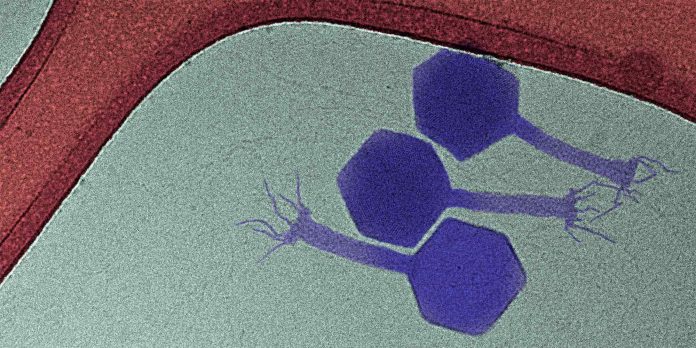Bakteryjny dormancy is survival strategy in response to stressful exposure to antibiotics taken by a patient for treatment. The dormant cells become tolerant to antibiotics and are killed at slower rate and survive sometimes. This is called ‘antibiotic tolerance’ which is unlike antibiotic resistance when bakteria grow in the presence of antibiotics. Chronic or relapsing infections are attributed to antibiotic tolerance, for which there is no effective treatment. Phage therapy has long been considered but the dormant bacterial cells are non-responsive and refractory to known bacteriophages. Scientists of ETH Zurich have identified a new bacteriophage that uniquely replicates on deep stationary-phase cultures of Pseudomonas aeruginosa. Named ‘Paride’, this bacteriophage could kill deep-dormant P. aeruginosa by direct lytic replication. Interestingly, this novel phage reduced bacterial loads through phage-antibiotic synergy when meropenem antibiotic was added to cultures. Apparently, the novel phage could exploit weak spots in the physiology of dormant bacteria to overcome antibiotic tolerance. These weak spots could be targets of new treatment for chronic infections caused by dormant or inactive bacteria.
Most bacteria on Earth are in dormant state of reduced metabolic activity or in completely inactive form of spore. Such bakteryjny cells can be readily resuscitated when required nutrients and molecules become available.
Bakteryjny dormancy or inactivity is the survival strategy in response to stressful external environmental conditions like starvation or exposure to antibiotics taken by a patient for treatment. In later case, the dormant cells become tolerant to antibiotics because cellular processes targeted by the antibiotics to kill bakteria are turned down. This phenomenon is called ‘tolerancja na antybiotyki' w takim przypadku bakterie są zabijane wolniej i czasami przeżywają (w przeciwieństwie do odporność na antybiotyki gdy bakterie namnażają się w obecności antybiotyków). Przewlekłe lub nawracające infekcje przypisuje się uśpionym, tolerującym antybiotyki komórkom bakteryjnym, często nazywanym „uporczywymi”, na które nie ma skutecznego leczenia.
Phage therapy involving bacteriophages or phages (i.e., Wirusy to poprzedzać bakteria), has long been considered for treating chronic infections by dormant or inactive bakteria however this approach works when host bakteryjny cells are undergoing growth. The dormant or inactive bakteryjny cells, however, are non-responsive and refractory to the bacteriophages which either avoid adsorption to the bakteryjny cell surfaces or hibernate in the dormant cells until resuscitation.
Known bacteriophages do not have ability to infect antibiotic-tolerant, deep-dormant or inactive bakteria. It was thought that given diversity, phages with ability to infect dormant cells may exist in nature. Researchers have now identified one such novel bacteriophage for the first time.
W niedawno opublikowanym badaniu naukowcy z ETH Zurich donoszą o izolacji nowego bakteriofaga, który w unikalny sposób replikuje się w kulturach w głębokiej fazie stacjonarnej Pseudomonas aeruginosa w laboratorium. Nazwali tego bakteriofaga Parada. Ten fag może zabić głęboko uśpiony P. aeruginosa poprzez bezpośrednią replikację lityczną. Co ciekawe, ten nowy fag zmniejszał obciążenie bakteryjne poprzez synergię faga i antybiotyku, gdy dodano do niego antybiotyk meropenemowy. P. aeruginosa-kultury fagowe.
Najwyraźniej nowy fag mógłby wykorzystać słabe punkty w fizjologii uśpionych bakterii, aby pokonać tolerancję na antybiotyki. Te słabe punkty mogą stać się celem nowego leczenia przewlekłych infekcji wywołanych przez uśpione lub nieaktywne bakterie.
***
Numer referencyjny:
- Maffei, E., Woischnig, AK., Burkolter, MR i in. Phage Paride może zabić uśpione, tolerujące antybiotyki komórki Pseudomonas aeruginosa poprzez bezpośrednią replikację lityczną. Nat Commun 15, 175 (2024). https://doi.org/10.1038/s41467-023-44157-3
***






































